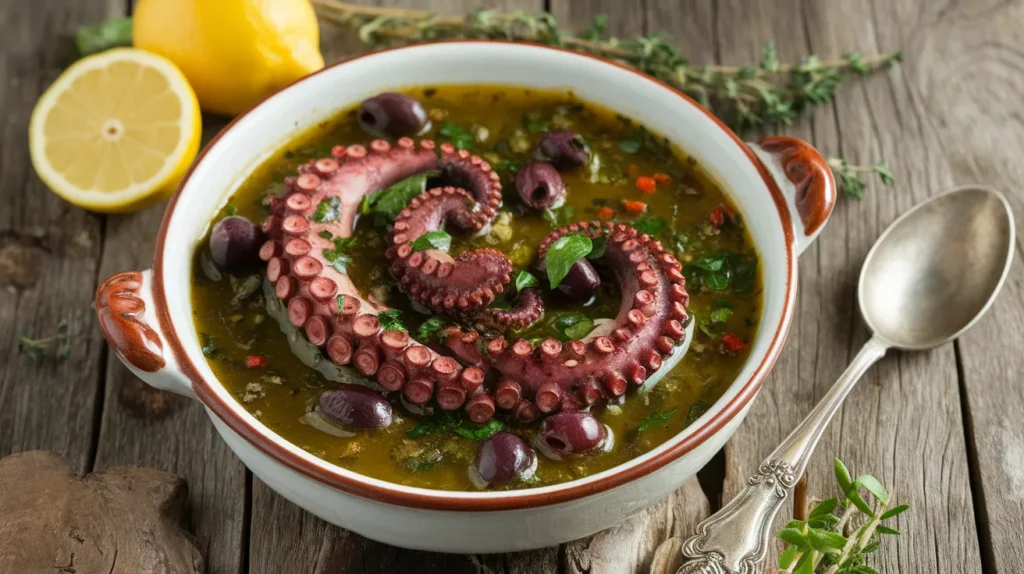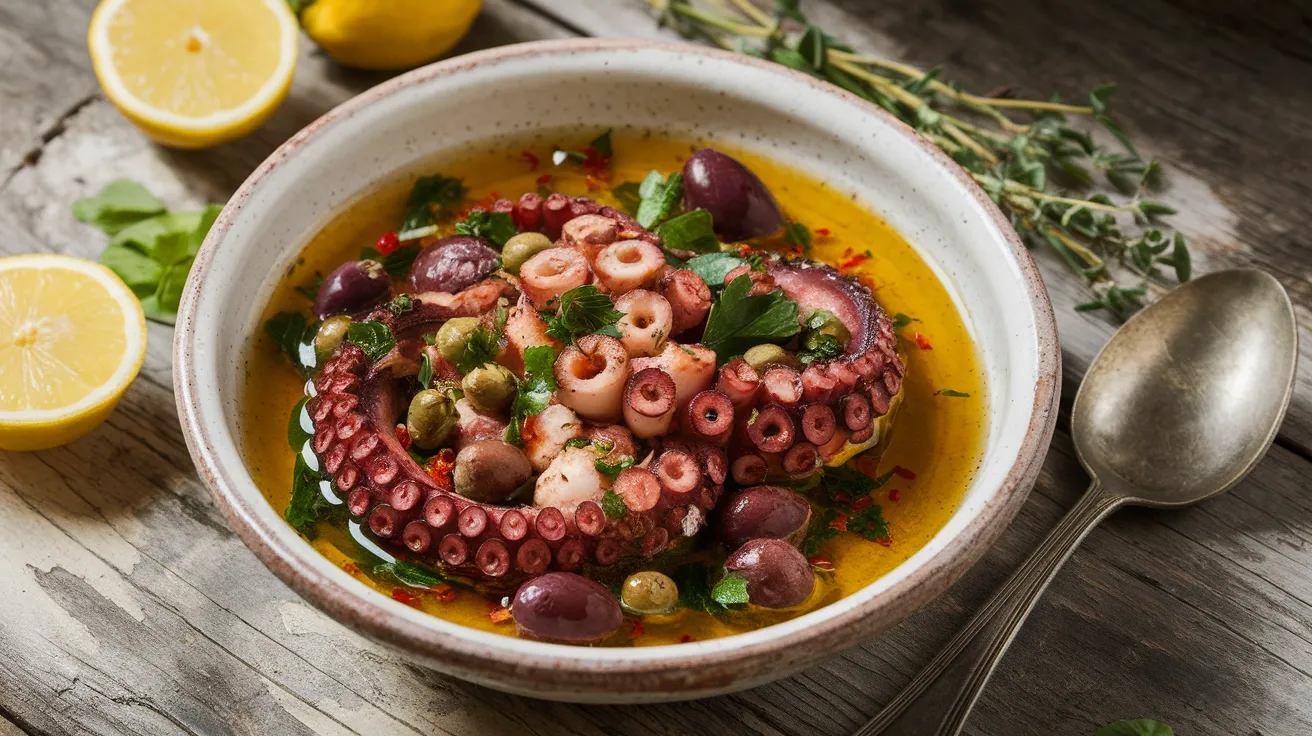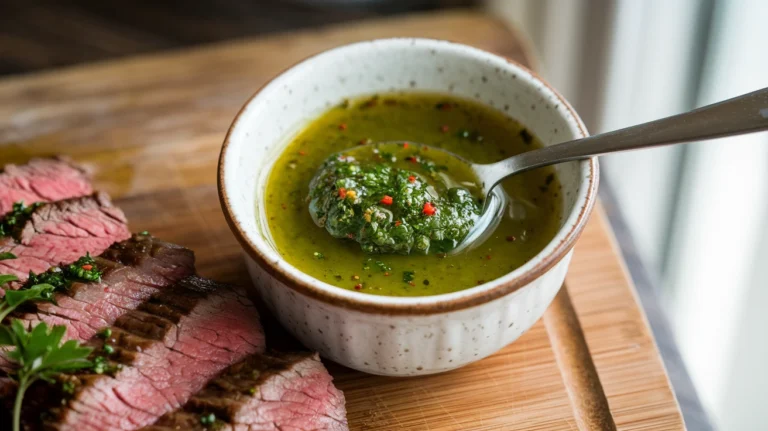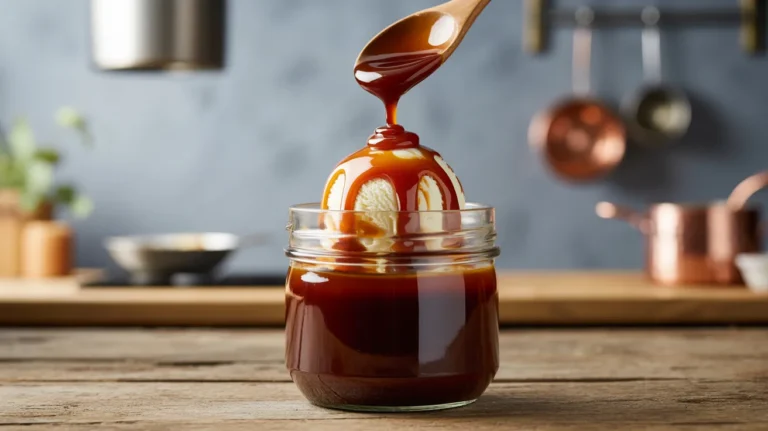This sauce for octopus transforms tender tentacles into a restaurant-worthy masterpiece that will wow your dinner guests. Our traditional Mediterranean sauce for octopus combines bright citrus, aromatic herbs, and premium olive oil to create the perfect companion for grilled or boiled octopus dishes.
SERVES: 4 | PREP: 20 MIN | COOK: 25 MIN | TOTAL: 45 MIN
Ingredients
Base Sauce
| Ingredient | Amount |
|---|---|
| Extra virgin olive oil | ¾ cup |
| Fresh lemon juice | ¼ cup |
| Red wine vinegar | 2 tablespoons |
| Garlic cloves, minced | 4 large |
| Shallot, finely diced | 1 medium |
Herbs & Aromatics
| Ingredient | Amount |
|---|---|
| Fresh oregano | 3 tablespoons |
| Fresh parsley, chopped | ½ cup |
| Fresh thyme leaves | 2 tablespoons |
| Bay leaves | 2 whole |
| Red pepper flakes | 1 teaspoon |
Flavor Enhancers
| Ingredient | Amount |
|---|---|
| Capers, drained | 3 tablespoons |
| Kalamata olives, pitted and chopped | ¼ cup |
| Tomato paste | 2 tablespoons |
| Sea salt | 1 teaspoon |
| Black pepper, freshly ground | ½ teaspoon |
Detailed Step-by-Step Instructions for Beginners
Phase 1: Preparing Your Workspace and Ingredients (8 minutes)
1. Set Up Your Cooking Station Before you begin making your sauce for octopus, arrange all ingredients on your counter in the order you’ll use them. This technique, called “mise en place,” prevents mistakes and ensures smooth cooking. Place your medium saucepan on the stove but don’t turn on the heat yet.
2. Prepare the Aromatics Properly Peel your 4 garlic cloves and remove any green shoots from the center (these can taste bitter). Using a sharp knife, mince the garlic into pieces no larger than rice grains. The smaller you chop, the more flavor you’ll release. For the shallot, remove the papery skin and dice into ¼-inch pieces – they should be uniform for even cooking.
3. Measure Your Liquids Accurately Pour ¾ cup olive oil into a measuring cup and set aside. In a separate small bowl, combine ¼ cup fresh lemon juice and 2 tablespoons red wine vinegar. Having these pre-measured prevents overcooking while you scramble to find ingredients.
Phase 2: Building the Aromatic Base (10 minutes)
4. Heat Your Oil to the Perfect Temperature Turn your burner to medium heat and add ¼ cup of your measured olive oil to the saucepan. Heat for 2-3 minutes until the oil shimmers like water but doesn’t smoke. Test readiness by dropping in a small piece of garlic – it should sizzle gently, not aggressively bubble.
5. Cook the Aromatics Without Burning Add your minced garlic and diced shallot to the warm oil. You’ll hear a gentle sizzling sound – this is perfect. Stir constantly with a wooden spoon for 2-3 minutes. The garlic should turn light golden and fragrant, while the shallot becomes translucent. If they start browning too quickly, reduce heat to medium-low immediately.
6. Build Deep Flavor with Tomato Paste Push the garlic and shallot to one side of the pan. Add 2 tablespoons tomato paste to the empty space and let it cook undisturbed for 30 seconds. This technique, called “blooming,” removes the raw taste and intensifies the tomato flavor. Then stir everything together for another 30 seconds.
7. Toast the Spices for Maximum Impact Add 1 teaspoon red pepper flakes and 2 bay leaves to your pan. Stir constantly for 30-45 seconds until you smell the spices – they’ll become more aromatic and slightly darker. This step is crucial for developing the complex flavors that make a great sauce for octopus.
Phase 3: Creating the Perfect Sauce for Octopus Base (8 minutes)
8. Add Acids at the Right Moment Remove your pan from heat completely (this prevents splashing). Slowly pour in your red wine vinegar and lemon juice mixture. The liquid will bubble and steam vigorously – this is normal and safe. The acidity will deglaze the pan, picking up all the flavorful brown bits from the bottom.
9. Return to Heat and Add Remaining Oil Place the pan back on low heat and gradually whisk in the remaining ½ cup olive oil. Add it slowly in a thin stream while whisking continuously. This creates an emulsion – a smooth, creamy texture that won’t separate. The process takes 2-3 minutes and your arm might get tired, but keep whisking for the best sauce for octopus.
10. Incorporate the Herbs Properly Remove the pan from heat again and immediately add 3 tablespoons fresh oregano and 2 tablespoons fresh thyme leaves. The residual heat will warm the herbs without cooking them harshly, preserving their bright flavor and color. Stir gently for 1 minute to distribute evenly.
Phase 4: Final Flavor Development (9 minutes)
11. Add the Briny Elements Return to low heat and add 3 tablespoons drained capers and ¼ cup chopped Kalamata olives. These ingredients provide the salty, briny notes that are essential in Mediterranean sauce for octopus. Stir gently to avoid breaking up the capers.
12. Season and Balance Your Sauce Add 1 teaspoon sea salt and ½ teaspoon freshly ground black pepper. Stir well and taste with a clean spoon. The sauce should taste bright, herbaceous, and well-balanced. If it’s too acidic, add 1 more tablespoon olive oil. If it needs more punch, add a pinch more salt.
13. Simmer for Flavor Integration Keep the heat at low and let your sauce for octopus simmer gently for 6-8 minutes. You should see tiny bubbles around the edges, but not vigorous boiling. Stir every 2 minutes to prevent sticking. During this time, the flavors meld together and the sauce reduces slightly to the perfect consistency.
14. Finish with Fresh Parsley During the last 2 minutes of simmering, stir in ½ cup chopped fresh parsley. This adds a bright, fresh note and beautiful green color to your finished sauce for octopus. The brief cooking time preserves the parsley’s vibrant appearance.
15. Final Preparation Steps Remove the 2 bay leaves using tongs or a fork – they’ve done their job flavoring the sauce. Turn off the heat and let the sauce rest for 5 minutes. This cooling period allows the flavors to settle and makes the sauce easier to handle when serving over your octopus.
Chef’s Notes for Perfect Sauce for Octopus
• Temperature Control: Keep heat at medium-low when adding herbs to prevent burning, which creates bitterness in your sauce for octopus.
• Oil Quality Matters: Use high-quality extra virgin olive oil as it forms the backbone of this Mediterranean sauce for octopus.
• Make-Ahead Tip: This sauce improves after resting for 2-4 hours, allowing the flavors to fully integrate.
• Consistency Check: The finished sauce should coat the back of a spoon but still flow easily over the octopus.
Nutrition Information (Per Serving)
- Calories: 185
- Protein: 1g
- Carbohydrates: 4g
- Fat: 19g
- Fiber: 1g
- Sodium: 340mg
Creative Sauce for Octopus Variations
Spicy Mediterranean Sauce
Add 2 tablespoons harissa paste and 1 minced jalapeño for heat lovers. This fiery version pairs beautifully with grilled octopus and crusty bread.
Citrus Herb Sauce
Replace red wine vinegar with orange juice and add lemon zest. Perfect for lighter summer preparations that highlight the octopus’s natural sweetness.
Green Goddess Style
Blend in ¼ cup fresh basil and 2 tablespoons pine nuts for a pesto-inspired twist. This variation complements both octopus and other seafood dishes like our sauce for mussels.
Smoky Paprika Version
Incorporate 2 teaspoons smoked paprika and 1 tablespoon sherry vinegar for Spanish-inspired flavors. Serve alongside our sauce for oysters dipping for a complete seafood spread.
Storage & Reheating Your Sauce for Octopus
Refrigerator Storage
Store your sauce for octopus in an airtight container for up to 1 week. The olive oil may solidify when cold – simply let it return to room temperature before using.
Freezing Instructions
Freeze in ice cube trays for up to 3 months. Thaw overnight in the refrigerator and whisk before serving to re-emulsify.
Reheating Method
Gently warm in a small saucepan over low heat, whisking constantly. Never microwave as it can break the oil emulsion.

Troubleshooting Common Sauce for Octopus Problems
Sauce Separates or Looks Oily
Solution: Remove from heat and whisk vigorously while slowly drizzling in 1-2 tablespoons warm water to re-emulsify the mixture.
Too Acidic or Tart
Solution: Balance with an additional 2 tablespoons olive oil and a pinch of sugar to mellow the acidity.
Lacks Flavor Depth
Solution: Simmer for 5 more minutes and add ½ teaspoon additional oregano plus a pinch more salt to intensify the taste.
Herbs Taste Bitter
Solution: You likely overcooked the herbs. Start fresh and add herbs off the heat or during the last few minutes of cooking.
Consistency Too Thick
Solution: Thin with warm water or lemon juice, adding 1 tablespoon at a time until desired consistency is reached.
Equipment Essentials
• Medium saucepan (2-3 quart capacity) • Wooden spoon for stirring without scratching • Fine mesh strainer (optional, for ultra-smooth texture) • Whisk for proper emulsification • Sharp knife for mincing garlic and herbs • Cutting board dedicated to aromatics • Measuring cups and spoons • Small bowl for ingredient prep
Shopping List by Store Section
Produce Section
- 1 lemon (for juice)
- 4 large garlic cloves
- 1 medium shallot
- Fresh oregano bunch
- Fresh parsley bunch
- Fresh thyme sprigs
Pantry/Condiments
- Extra virgin olive oil
- Red wine vinegar
- Tomato paste
- Capers (small jar)
- Red pepper flakes
- Bay leaves
- Sea salt
- Black peppercorns
Deli/International
- Kalamata olives (pitted)
Success Secrets for Perfect Sauce for Octopus
1. Prep Everything First: Measure all ingredients before you start cooking. This sauce for octopus comes together quickly once you begin.
2. Temperature Control: Keep heat at medium-low throughout cooking to prevent the garlic from burning and herbs from becoming bitter.
3. Quality Ingredients: Use the best olive oil and freshest herbs you can find – they make a noticeable difference in the final sauce for octopus.
4. Taste as You Go: Adjust seasoning throughout the cooking process rather than waiting until the end.
5. Rest Before Serving: Allow the completed sauce to sit for 10-15 minutes before serving to let all the Mediterranean flavors harmonize perfectly.
This sauce for octopus brings restaurant-quality Mediterranean flavors to your home kitchen. The combination of aromatic herbs, quality olive oil, and bright acidity creates the perfect complement to tender octopus that your family will request again and again.




